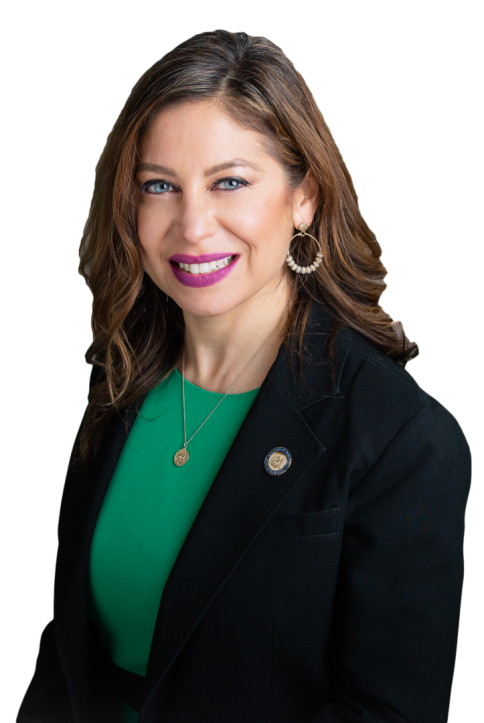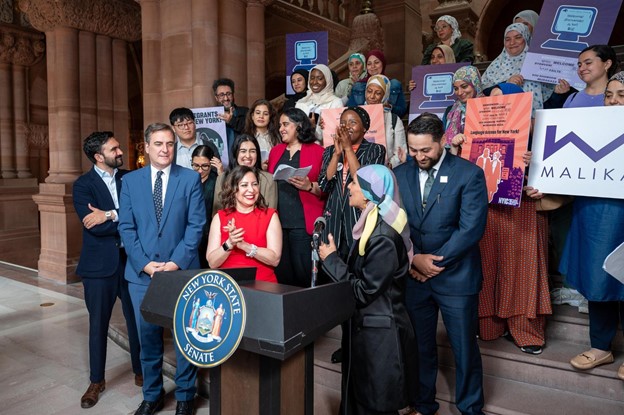Assembly Member Jessica González-Rojas, Senator Gianaris & Advocates Rally to Call for Passage of Legislation Recognizing Middle Eastern and North African Individuals in State Data
Albany, NY —Today, Assembly Member Jessica González-Rojas, State Senator Michael Gianaris and several advocacy groups including the New York Immigration Coalition and Malikah rallied in the Capitol to call for the passage of (A6219B/S6584B) in this legislative session. This was followed by the legislation being reported out of the Assembly Government Operations Committee to the floor of the Assembly. The bill would disaggregate state-collected data for Middle Eastern and North African (MENA) New Yorkers from the White category giving more than 500,000 MENA people within New York State, a stronger voice and access to critical resources.
This stems from a legal ruling in 1944 that deemed all persons from the MENA region, regardless of their religion, “White by law” alongside European Americans. Due to this, Middle Eastern and North African communities throughout New York State are inappropriately identified as white in government data. As a result, these communities miss out on critical resources and services, exacerbating disparities, including limiting access to Minority and Women Business Enterprise (MWBE) support. MENA populations experience specific disparities and needs which are not accounted for in government data because of the lack of data disaggregation. The MENA bill requires that every state agency, board, department or commission that directly collects demographic data regarding ancestry or ethnic origin to disaggregate Middle Eastern or North African populations from the white demographic or collect separate data on each major Middle Eastern or North African group.
“Middle Eastern and North African (MENA) communities have been made invisible by our federal and state governments’ data collection methodologies, despite having a strong and historical presence in districts like mine in Queens. Lumping MENA communities into the ‘White’ category creates intentional systemic exclusion from programs and services dedicated to communities of color. Disaggregating the White category to identify the MENA population is extremely important, as it will remove certain barriers and allow much-needed resources to reach these residents. The coalition, Senator Gianaris and I urge the legislature to pass this bill immediately to ensure that these communities are accounted for, better understood, and better resourced. Data is power,” said Assembly Member Jessica González-Rojas, prime sponsor of the bill.
MENA communities across New York State remain underserved, exhibiting high rates of language access needs, housing insecurity, poverty, domestic abuse, and health disparities. Businesses and organizations that primarily serve these communities struggle to receive equity-based aid because those they serve are classified as white. This can have a direct impact on New Yorkers – such as when a small business is applying for MWBE contractor status, who may be denied because they would be demographically mischaracterized.
The U.S. Census indicates that at least 280,000 MENA residents live in New York, but studies indicate that the number is likely over 500,000. Recently the Biden administration announced their own plans to recognize MENA on the federal census and surveys.
"It’s more important than ever for us to recognize MENA NYers. For many years, Middle Eastern and North African communities, like Egyptians in Little Egypt, haven't been properly seen in official NYS data. This means challenges we face, like staying safe and having enough food, aren't noticed and are erased. When our issues aren't counted, it's hard to get help and make things better. We need to make sure our experiences are included in data so we can get the support we need and make our community stronger. This is why more than ever we need to pass this bill that creates a category for over 500,000 Middle Eastern and North African New Yorkers so we can more accurately depict our heritage and give NYS the ability to better provide services and resources to our people. We can no longer afford to be erased,” said Rana Abdelhamid, Executive Director of Malikah.

